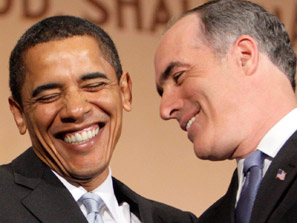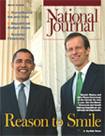 Senator Bob Casey, Jr., a Catholic, pro-life Democrat, recently became Barack Obama’s highest-profile backer in the Pennsylvania, which holds its primary later this month. God-o-Meter interviewed Casey on Monday afternoon about Obama’s struggles to win Catholic voters, how to use Scripture to articulate political positions, and the role of the Clintons in denying Casey’s dad a speaking role at the ’92 Democratic convention.
Senator Bob Casey, Jr., a Catholic, pro-life Democrat, recently became Barack Obama’s highest-profile backer in the Pennsylvania, which holds its primary later this month. God-o-Meter interviewed Casey on Monday afternoon about Obama’s struggles to win Catholic voters, how to use Scripture to articulate political positions, and the role of the Clintons in denying Casey’s dad a speaking role at the ’92 Democratic convention.
How important will Catholics be in determining the winner of Pennsylvania’s Democratic primary this month?
I don’t know the exact percentage, but it’s a sizeable percentage of the Democratic primary—maybe as much as 40-percent or more. It’s a huge number of voters. But I’m not sure it’s a block. Catholics are every bit as diverse as any other sort of voters out there, with conservative Democrats and moderates. So often generalizations don’t apply to Catholic voters. Catholics are concerned about the war, the economy, about issues like abortion, issues pertaining to the budget and funding Medicaid and Medicare and what happens to the environment.
It’s interesting that in this primary, both candidates throughout the campaign have talked about their own faith and the way their faith guides part of their life. It’s rather unique for Democrats to be addressing questions of faith and values in such a direct way. For years the national party, their standard procedure was ‘don’t talk about and it.’ Now Democrats are not just talking about their faith but listening to other people that might be of other faiths, listening to their point of view… at the national level, there used to be some—hostility is the only word that described the party’s discussion about faith and values, and I think that’s passed.
Your father, then-Pennsylvania Governor Bob Casey, was famously denied a speaking role at the 1992 Democratic National Conventional because of his pro-life views. Was that the embodiment of the party’s hostility toward faith and values?
At the time, it was certainly an example of that. It is still referred to as an example of how a political party at the national level was far too hostile to the point of view of a two-term governor. The party learned from that. It was not only the wrong thing to do, but there were other ways to handle it.
Bill Clinton was the Democratic nominee for president in 1992. Do you blame him for the way the convention was handled?
I think you can probably unearth how that exactly came about but it was a strategic or at least a tactical blunder that caused a lot of Democrats to be pretty angry for a long time. President Clinton has addressed it in his book My Life and he understood at the time the seriousness of it and I have no reason to doubt what he wrote in his book.
But when I made the decision about [endorsing] Obama it really was about him and about the future…. it was not a question of saying I’m rejecting one side in order to help the other.
Obama announced on Friday that he’d participate in a “compassion forum” in Pennsylvania next weekend sponsored by the progressive religious group Faith in Public Life. Did you have a hand in that?
I suggested that he go. I don’t profess that that’s the reason he’s going, but [the Obama campaign] asked our advice on a number of things and you try to give it and you always have to do it with a certain amount of humility…. As recently as ten years ago, Democrats running for president might not have gone to something like that. It’s a very positive development.
This is the second Democratic faith forum of the ’08 campaign. How do you respond to Democrats who say Democrats have gone too far in giving public testimony about their faith to prove that they’re true believers?
There’s no question that a public official of either party can take it too far, and it’s up to the candidate to be able to strike that balance, the balance that is the separation of church and state. The way I’ve always looked at this is that every candidate has a right to talk as much or as little about their faith as they deem appropriate. Another guideline for me is that your faith can inspire and inform and sometimes enrich your public policy points of view and how you vote on a particular piece of legislation, but it should not dictate that [point of view]… there are some people who think that it should be dictated and I happen not to accept that way of making public policy.
There was a lot of footage of the Rev. Martin Luther King, Jr. on TV the last few days, marking the 40th anniversary of his assassination, and it didn’t seem like the line between faith informing his positions and dictating them was one that he acknowledged.
I do think there’s a difference between what a religious leader says and does and what a public official or legislator does. But there’s no question that a lot of our legal underpinnings find a good bit of their foundations in the Scriptures. Sometimes I as a public official turn to Scripture or hymns—especially hymns, because sometimes we Catholics don’t have the Scriptures memorized like we should—to help me explain a public policy position or an idea or to be able to articulate it better when you’re talking about justice or mercy or compassion. I use it more as a way to explain public policy than to say that the literal teaching of the Scriptures tells me which positions to take, which I think takes it too far. But there are plenty of people who disagree with that.
Hillary Clinton won Catholics almost two-to-one in Ohio and a recent Gallup poll shows her with a 20-point lead over Barack Obama among Catholics nationally. What explains her advantage?
I’m not sure I have an easy answer to that. If you look at polling in the ’90s, when Clinton was in office, there were some strong ties from that. A good part of his constituency was Catholic voters, and she may be benefiting from that. And she’s been in and out of our state for a number of years and sometimes there’s just a familiarity. Obama has been very effective in other states that he’s been able to spend time in and get to know people in and he’s been able to do more of that in Pennsylvania.
Do you think Obama has any attributes that would have special appeal to Catholics?
He’s been able to have a strong sense of what it’s like to be an underdog in society, having had to overcome all the obstacles he’s had to overcome in his life, even apart from but especially his race. Not just to be a candidate for president but to be one of just three people out of 300 million to be in the final, so to speak, is a remarkable achievement. So he can identify with and understand what it’s like to have obstacles in front of you and be an underdog. And that carried with it my sense of knowing him for a couple years now… he has a strong sense of right and wrong and a strong sense of justice and a real commitment to the common good. He knows when party is not always right and that we have to unify on the issues….
One thing I should mention is that Senator Obama has talked about… his experience as a community organizer when he was very young and I had a similar experience in the Jesuit volunteer corps. And one of several reasons he and I had a good understanding of each other is that we both had the same experience, of being in communities that were struggling and trying to be of service. And for me it was not because there was some program… or because of my own strong sense of trying to vive back but a lot of it had its foundation in my faith. I’m not sure if it were just a volunteer program as opposed to a Jesuit volunteer program if I would have had the inclination to participate….
He also has a sense of compassion and empathy. Some public officials are blessed—you can’t acquire this, but you are blessed with the gift of empathy, being able to empathize with those who are suffering. And he’s been given that gift.
Pro-life groups have criticized Obama for opposing the Partial Birth Abortion Ban Act as a U.S. Senator and the Born Alive Infant Protection Act as an Illinois legislator. How do you square your pro-life stance with someone as adamantly pro-choice as Obama?
I disagree with that in a very fundamental way, and I’m sure they’ll be other things I disagree with that are serious. I do think, though that he’s the kind of public official… who takes the time and puts forth the effort to understand people who disagree on the issue of abortion and other issues. This is an issue where there is more finger pointing than there are attempts to bridge the gap, more lecturing than listening. But [Obama] has shown already to be the kind of person who listens as much as he preaches. And I think he’s someone who tries to find common ground. He’s had strong relationship with some fairly conservative members of the U.S. Senate. He would try to get to know people on the human level even if he couldn’t agree with them on issues.
There’s a common ground on the issue of abortion that doesn’t get much attention, but there’s growing consensus on both sides of the issue—even with extremes on either end—that we want to reduce the number of abortions. We can debate on how to get there, but there is consensus about that. I think he would try to enhance that consensus. Part of that is certainly family planning, and one way is also adoption. [Obama] has talked about that several times, as well as helping pregnant women. I don’t think either party is doing nearly enough to help pregnant women. A bill in the House that is identical to one I introduced in the Senate would get serious about helping pregnant women… by giving them a real choice. Sometimes they’re all alone and they have a legal right to abortion but a lot of them would rather bear the child if someone could help them along the way.
Has Obama or Clinton signed onto your abortion reduction legislation?
They haven’t, but I’ve just begun to dialogue with individual senators. [Obama] will be among the senators I’m talking to.
8

